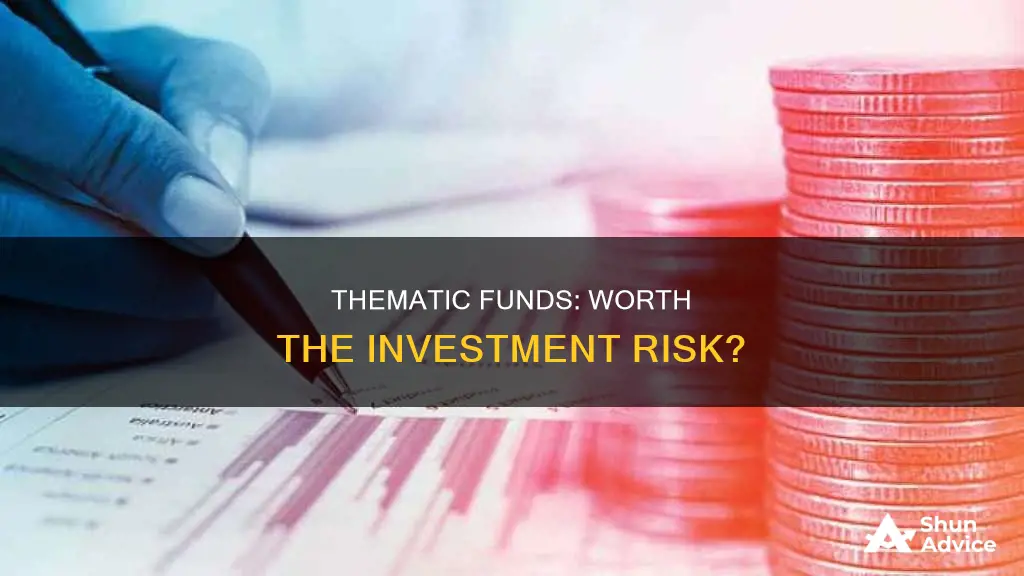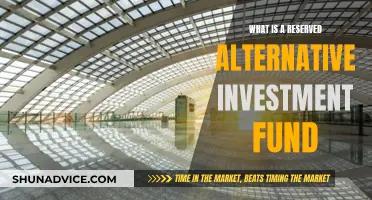
Thematic funds are a type of investment strategy that focuses on identifying macro-level trends and investing in companies that are expected to benefit from these trends. These funds have gained popularity, especially in India, with asset management companies innovating in this space. While thematic funds offer the potential for high returns and more diversification than sectoral funds, they also come with higher risks. Before investing in thematic funds, it is essential for investors to understand their risk appetite, investment goals, and the time horizon for their investments. This paragraph provides an introduction to the topic of investing in thematic funds, highlighting the key considerations and potential benefits and risks associated with this investment strategy.
| Characteristics | Values |
|---|---|
| Type of fund | Open-ended equity schemes |
| Type of investor | High-risk appetite, seeking long-term returns, well-informed and evolved |
| Diversification | More diversified than sectoral funds but less so than multi-cap funds |
| Returns | Market-beating returns if the theme is right |
| Risk | High-risk category, returns are tied to a theme playing out |
| Investment horizon | More than 5 years |
| Taxation | 15% tax on short-term capital gains, 10% tax on long-term capital gains over 1 lakh in a financial year |
What You'll Learn
- Thematic funds are high-risk investments, suitable only for experienced investors
- Thematic funds are more diversified than sectoral funds but less so than multi-cap funds
- Thematic funds are suitable for investors with long-term goals
- Thematic funds are a good option for investors who are well-informed and evolved
- Thematic funds are equity funds, so they can be volatile in the short term

Thematic funds are high-risk investments, suitable only for experienced investors
While thematic funds can offer more diversification than sectoral funds, they are still considered a semi-diversified portfolio. This is because they are tied to a specific theme, which restricts the scope of investment opportunities. If that theme does not play out as expected, there is a high risk of losses. For example, the infrastructure theme boomed in 2007, but over 10 years later, it still hasn't witnessed any real development.
Additionally, the success of thematic funds depends on the chosen theme playing out. If it doesn't, the stocks will likely underperform, resulting in massive losses. This is why thematic funds are not recommended for first-time investors.
Furthermore, thematic funds should not make up a large portion of an investor's portfolio. It is recommended that exposure to these funds should not be more than 10% of a portfolio, with some sources suggesting an even lower allocation of 5%.
In conclusion, thematic funds are high-risk investments that are only suitable for experienced investors with a high tolerance for risk and a good understanding of different sectors and market trends.
Liquid Funds India: A Smart Investment Guide
You may want to see also

Thematic funds are more diversified than sectoral funds but less so than multi-cap funds
Thematic funds are a type of investment fund that focuses on specific themes or trends, such as renewable energy, technology, or healthcare. They are often compared to sectoral funds, which focus on companies within a specific industry, and multi-cap funds, which are more diversified and invest across multiple sectors and industries.
Thematic funds are considered more diversified than sectoral funds because they invest in companies related to a specific theme or trend, which may include multiple sectors. For example, a thematic fund focused on rural consumption can invest in stocks related to agri-inputs, two-wheelers, discretionary consumer products, and white goods. On the other hand, a sectoral fund would only invest in companies within a specific sector, such as energy or pharmaceuticals. This broader focus of thematic funds makes them less susceptible to negative impacts when a single sector underperforms.
However, compared to multi-cap funds, thematic funds are considered less diversified. Multi-cap funds, also known as diversified equity funds, invest across multiple sectors and industries without being limited to a specific theme. They provide exposure to a wider range of companies and industries, reducing the risk associated with concentrating on a single theme or sector.
It is important to note that while thematic funds offer more diversification than sectoral funds, they still carry a high level of risk. The performance of thematic funds is heavily dependent on the chosen theme, and a downturn in the related sectors can result in significant losses. Therefore, investors considering thematic funds should carefully evaluate their financial goals, risk tolerance, and investment horizon before making any decisions.
Mutual Funds: A Smart Way to Invest Generally
You may want to see also

Thematic funds are suitable for investors with long-term goals
Thematic funds are a type of investment strategy that focuses on identifying macro-level trends and investing in companies that are expected to benefit from these trends. These trends are often related to global economic shifts, such as emerging markets, technological changes, or environmental concerns.
While thematic funds can be risky due to their narrow focus, they can be suitable for investors with a long-term investment horizon. Here are a few reasons why:
- Time for themes to play out: Some themes may take a significant amount of time to reach their full potential. For example, the software and internet technology theme took about 20 years to fully materialize.
- Reduced risk over time: While thematic funds can be volatile in the short term, the risk associated with these investments tends to decrease over a longer period.
- Long-term trend alignment: Thematic funds are designed to align with long-term trends and can help investors capture opportunities presented by these trends.
- Patient capital: Investors with long-term goals tend to have a more patient outlook, which is well-suited to thematic funds. It takes time for the themes to develop and for the investments to bear fruit.
- Compounding returns: With a longer investment tenure, the power of compounding can help mitigate some of the risks associated with thematic funds.
- Evolving themes: Themes in thematic funds can evolve over time, allowing investors to benefit from new sectors and ideas that emerge within the theme.
In summary, thematic funds can be a good fit for investors with long-term goals and a patient outlook. However, it is important to remember that thematic funds are high-risk investments, and investors should carefully consider their risk appetite and conduct thorough research before investing.
Vanguard Index Funds: Best Bets for Your Money
You may want to see also

Thematic funds are a good option for investors who are well-informed and evolved
Thematic funds are a type of investment strategy that focuses on identifying macro-level trends and investing in companies that stand to benefit from those trends. These funds are often based on a central theme, such as a particular industry or sector, and they invest in a variety of companies within that theme. For example, a fund with an infrastructure theme might invest in companies in the steel, cement, and construction sectors.
One of the key advantages of thematic funds is the level of diversification they offer. Unlike sector funds, which only invest in one specific industry, thematic funds spread their investments across multiple sectors. This means that if one sector is underperforming, the other sectors can still generate returns and protect the portfolio from significant losses.
Additionally, thematic funds can provide market-beating returns if the chosen theme performs well. However, this requires careful monitoring of news and headlines related to the theme, as well as a deep understanding of the different sectors involved. This is why thematic funds are best suited for well-informed and evolved investors who have a strong knowledge of various sectors and the ability to identify valuable investment opportunities.
It is important to note that thematic funds may not be suitable for first-time investors due to their high-risk nature. These funds are recommended for investors with a high-risk appetite and a long-term investment horizon. Even for experienced investors, it is generally advised that exposure to thematic funds should not exceed 10% of their portfolio.
SBI Dynamic Bond Fund: Worth Investing?
You may want to see also

Thematic funds are equity funds, so they can be volatile in the short term
Thematic funds are a form of investment that aims to identify macro-level trends and the underlying investments that stand to benefit from the materialisation of those trends. They are open-ended equity schemes that invest in stocks tied to a theme. For example, a fund with infrastructure as its theme will invest in companies in sectors like steel, cement, and construction.
Therefore, thematic funds are suitable for investors with a high-risk appetite and those seeking returns in the long term. It is recommended that first-time investors stay away from thematic funds.
Invest Small, Think Big: Strategies for Meaningful Returns
You may want to see also
Frequently asked questions
Thematic funds are a type of investment strategy that focuses on identifying macro-level trends and investing in companies that are expected to benefit from those trends. These funds are typically based on a central theme, such as a specific industry or sector, and invest in a variety of sectors and companies within those sectors that are relevant to the theme.
Thematic funds offer more diversification than sector funds, as they invest across multiple sectors. They can provide market-beating returns if the chosen theme performs well. Additionally, thematic funds allow investors to align their investments with their personal beliefs, values, and interests.
Thematic funds are suitable for investors with a high-risk appetite and a long-term investment horizon. They are also a good option for well-informed and evolved investors who have a good understanding of different sectors and can monitor the performance of their chosen theme.
Thematic funds are considered high-risk investments because they have a semi-diversified portfolio. If the chosen theme does not perform as expected, there is a high risk of losses. Additionally, some themes may take longer than expected to play out, and the expense ratios of managing these funds can eat into the returns.
You can invest in thematic funds through mutual funds or exchange-traded funds (ETFs). It is important to consider the investment objectives, risks, charges, and expenses associated with these funds before investing.







